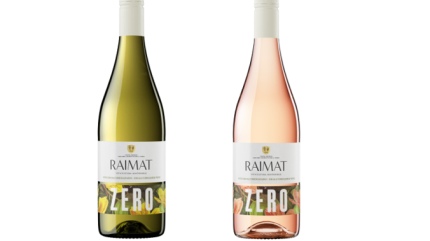
Spain-based wine group Raventós Codorníu has added to its non-alcoholic range with its first ‘zero’ alcohol still wine.
The group already markets a non-alcoholic cava sparkling wine but is rolling out Raimat Zero still wines.

Discover B2B Marketing That Performs
Combine business intelligence and editorial excellence to reach engaged professionals across 36 leading media platforms.
Raventós Codorníu is selling two wines – a white and a rosé – which have alcohol content of less than 0.5% and therefore allowed to be classified as non-alcoholic.
The company has made its Raimat Zero Blanco from Xarel-lo and Chardonnay. Its Raimat Zero Rosado comes from Merlot, Cabernet Sauvignon and Grenache. The wines have an RRP of €8.95 ($9.67).
The Raimat winery, located in Lleida in Catalonia’s north-east, is one of fifteen in the Raventós Codorníu portfolio in Spain, Argentina and California.
The group is working to make the Codorníu brand 100% organic by 2024 – a milestone that has already been achieved by the Parxet, Titiana and Raimat cava brands. Its new Raimat Zero wines are certified organic.

US Tariffs are shifting - will you react or anticipate?
Don’t let policy changes catch you off guard. Stay proactive with real-time data and expert analysis.
By GlobalDataRaventós Codorníu’s wider brand portfolio includes Viña Pomal, and La Vicalanda in Spain, plus Artesa in California and Séptima in Argentina.
While non-alcoholic wine remains an emerging market, some major producers of conventional wine are making investments in the area.
Schloss Wachenheim is doubling production capacity for its non-alcoholic sparkling wine to meet growing demand for alcohol alternatives, the German sparkling-wine group told Just Drinks in May.
Earlier this month, Champagne giant Moët Hennessy Louis Vuitton (LVMH) bought a minority stake in French alcohol-free sparkling wine brand French Bloom.
Speaking to Just Drinks in May, French Bloom co-founder Frerejean-Taittinger said around “80% of our customers” in the markets where the company does business “are actually individuals who enjoy both alcoholic and non-alcoholic beverages interchangeably throughout their evenings, weeks, or months”.
She added: “They are ‘flexi-drinkers’ and interestingly, our core clientele reflect where I believe the wine market is going: drinking higher quality but less often.”



